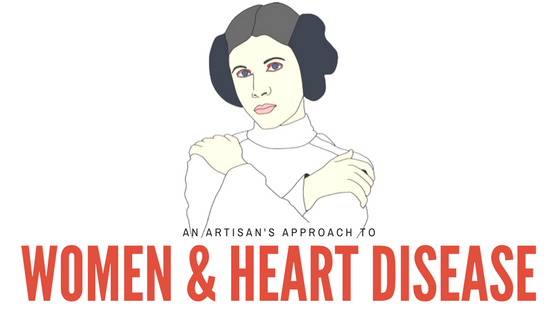Recent celebrity deaths including those of Carrie Fisher and her mother Debbie Reynolds just one day later have spurred lots of questions about women and heart disease. What caused these deaths? Why so close together? Am I at risk? These are all very good questions. Another major topic of discussion since the deaths of Fisher and Reynolds is the “broken heart syndrome,” which explores the idea that the heart can give out after an extremely traumatic event, such as the loss of a child. Let’s take a look at some of the basics of heart disease in women, what we know about the “broken heart syndrome,” and how we can minimize our risk.
Facts About Women and Heart Disease
Did you know that only about half of women in the U.S. realize heart disease is the number one killer of females? Educating ourselves on heart disease is the best place to start to understand our own risk and how to manage heart disease. Here are a few quick facts about women and heart disease:
● Heart disease is the leading cause of death in women, accounting for more than 35 percent of deaths among women in the U.S.
● Among women who experience sudden death from coronary heart disease, over 60 percent had no previous symptoms.
● Over 20 percent of women will die within the year after a first heart attack, and when compared to men, women are twice as likely to die within the next several weeks.
● Women are at much higher risk for heart disease after menopause.
● High cholesterol can double the risk for heart disease, and in the U.S., more women than men have high cholesterol.
Symptoms of Heart Disease in Women
The symptoms of heart disease in women can vary greatly from those in men, and every individual is different. It’s not uncommon for women to experience no chest pain at all before or during a heart attack, reporting feelings of flu-like weakness, nausea, or headaches instead. Other symptoms of heart disease in women include:
● Angina (dull or sharp pain in the chest caused by muscle pain of the heart)
● Jaw or neck pain
● Back pain
● Heart palpitations or “fluttering”
● Swelling of the legs and feet
● Shortness of breath
The “Broken Heart Syndrome”
Can you die of a broken heart? This question has freshly surfaced following the death of Debbie Reynolds, who lost her daughter Carrie Fisher to heart disease just one day before her own death. As striking as it may sound, in the past decade doctors are beginning to take this possibility much more seriously. “Old movies used to depict a character clutching his chest and collapsing with a heart attack after hearing some shocking and terrible news,” writes Dr. Aarush Manchanda in his new book An Artisan’s Approach™ to Understanding Heart Health. “Back then, cardiologists knew a heart attack didn’t work like that,” he continues, “that only happened in the movies!” But today, that’s all changed.
The medical diagnosis of “broken heart syndrome” is called Takotsubo Cardiomyopathy, and while it looks the same as a regular heart attack caused by blocked arteries, it’s caused by sudden, intense levels of stress flooding the heart. Dr. Manchanda explains:
“When a patient’s blood is tested during a Takotsubo cardiomyopathy, it shows very high levels of adrenaline. And, it’s well-known that the sudden onset of excessive stress or continuous stress over time causes a massive release of adrenaline. There’s no coincidence here: while some amount of stress can be a positive force in our lives, too much stress is detrimental, not only to our mental health but also to our hearts.”
Whether or not “broken heart syndrome” affected Debbie Reynolds is unknown. While reports indicated that she died of a stroke, it is possible that Takotsubo cardiomyopathy could have played a contributing role. Amidst the sadness of the tragic event, however, we are seeing encouraging surges in interest in preventing heart disease, particularly for women.
How Can Women Help Prevent Heart Disease?
We know that the best way to take care of our heart is through good prevention, and this is especially true for those with a family history of heart disease. “Genetic risk is very strong for heart disease,” explains Dr. Manchanda in a Business for Breakfast radio interview, “if you belong to a family with heart disease, I think you have to be extremely proactive about your lifestyle.” Some good methods for prevention include:
● Monitoring your blood pressure and cholesterol
● Knowing your family history
● Getting enough exercise
● Eating a heart-healthy diet with lots of fruits and vegetables
● Avoiding smoking
● Limiting alcohol consumption
● Practicing stress management
The fact is, each and every one of us is different, and every heart has different needs. A method of prevention is likely to be more important to one heart than another. That’s why an individualized plan like the Artisan’s Approach™ is so important. For both women and men, a personalized understanding of your “Heart House” along with its build, wiring, and plumbing provides the best and most accurate assessment and care for your heart health. To learn more, discover Your Heart House and take control of your heart health today.


Leave a comment